Juvenile politics and gullible electorate
By Dr. Y Ratnayake, former Director of the College of Banking and Finance, IBSL.
Sri Lankans appear to be living in Alice’s wonderland as promises galore around with the approaching new presidential poll. Political rallies, TV debates some of which are of course aborted, press conferences, donation campaigns, inaugurations etc. are conducted relentlessly on the daily basis by the prospective aspirants for the country’s topmost leadership. The hoi polloi is given the impression that our contending candidates are so altruistic and restlessly awaiting the opportunity to serve the suffering masses.
An overall review of the main propaganda themes used by the contending political parties engaged in the electoral campaign reveals that campaign themes have been concentrated into three major economic and political amphitheaters; regime change or system change, continuation of economic stability and catching robber barons or elimination of corruption combined with providing economic reliefs to the electorate for which a mass mandate is sought for by the three major contending parties at the forthcoming presidential polls. Judging by the large crowds attending all contenders’ campaign rallies and thunderous applauds given in approval of their leaders’ speeches, one may reasonably assume that the hoi polloi of the country is delighted in general with the promises given and has not even an iota of doubt about the practicality of fulfilling such generous promises.
System Change:
The campaign aimed at system change is based on the belief that the numerous political regimes that have hitherto dominated the political atmosphere in the country represent the same social and economic stratum which is driven by the need to ensure perpetuality in the status quo that fits into the socioeconomic needs of the bourgeois. In other words, the system change in their lexicon more or less resembles the extraction of the dominant political and economic grip of the elite (borrowed from their vocabulary) and the transfer of power unto a new breed of social class that has never been on the political saddle of the country since independence.
However, the term system change can connote multifaceted dimensions extending over the change of economic structure, novel development approach and unprecedented changes introduced in all or some subsystems that are radically digressed from the hitherto existing methodologies instrumentalized in managing the production and administrative machinery of the country. Another main propaganda drive of the regime change vanguard is related to their continuous effort to implant an impression in the electorate that they are a totally different breed of human specimens whose behavior, values and emotions are poles apart from those of the politicians who have been on the political saddle up to now. In other words, it appears that they want to go the whole hog to provide an ironclad guarantee to the effect that there is no room, if elected to power, for human errors, emotions, sentiments and biases under their regime as far as governing of the country is concerned.
Emotions, like gravity and death, are in fact a certainty and intrinsic characteristic of all human beings, as such, if someone professes that gravity and death can be defied then the audience has an inalienable right to know the details of the mechanism that helps oneself negate gravity. A person with an objective mindset and good exposure to cosmopolitan environment may wonder after reading their speeches reported in public media whether the proposed structure is a utopian system that can find solutions to all the economic woes, like panacea, or a mere blathering coming out of a juvenile mindset.
Furthermore, this line of argument appears to be akin to the denial of the existence of gravity which governs both flora and fauna inhabited on the earth; in the same breadth, the driving force of living beings, both human and animal, is molded in selfishness, a universal and ubiquitous factor, with minor variations in individuals only in the degree of selfishness. In the 18th century, a great political philosopher and economist in his magnum opus stated that human behavior was essentially characterized by economic man or homo economicus traits which is construed as the foremost motivational drive of man. This explanation goes parallel and appears to be in congruence with the evolutionary theory of Darwin, Marxist political philosophy and even with the teachings of the great religious leaders who foresaw that human behavior would always be energized by selfishness, avarice, hatred, love, emotions, sex, economic benefits and so forth.
Whenever a wingnut political group professes that its members are immune to the intrinsic forces propelling human activity, it is tantamount to posing a challenge to the unequivocal ground realities of human nature on one hand and to grounding their logic of reasoning on exceptionalism or perhaps transhumanism both of which have not been proven anywhere in the world as a crucial element influencing the majority behavior in any society.
However, it suffices to state in this context that exceptionalism as a concept is not only an unsubstantiated method for appealing to the people in the political vortex but also a concept not supported by axiomatic evidence and theoretical underpinnings that explain individual behavior. To counter weaknesses of exceptionalism, an alternative factor, system change, may also be brought onto the political stage which, for the sake of argument, can perform the role of deterrent counterbalancing the malefic influence of human emotions on the administrative mechanism of the proposed new political regime. Nonetheless, one may be tempted to pose the question in this regard whether the impacts of human emotions have totally been eliminated on the business of governance by creating a firewall in the countries namely, inter alia, Russia, China, North Korea, Cuba where system changes in the magnitude of paradigm shift have been established and in full swing for several decades. Systems can be changed, tinkered, amended and replaced but system change per se does not guarantee the achievement of the desired goal since the operator of the new system is the prototype of the same old economic man.
It may be pertinent to draw the attention of the readers in this context to an English adage which states that old birds cannot be caught with chaff since they know the difference between chaff and rich grain. The new broom will definitely sweep well but what is the ironclad assurance one can furnish that the performance of the new broom is also ephemeral, proving the time tested and universally attested theory of marginal utility and diminishing performance as time wares out.
Demagogy as Political Palanquin
The other contending party for the forthcoming presidential election has built its propaganda mechanism on the time-tested strategy of demagogy, a system of appealing to the most sensitive sentiments of the masses, bringing robber barons to the book in the event of their being selected to the topmost position. Tax reductions, cricket stadiums, farmer subsidies, jobs for all unemployed graduates, and state-of-the-art IT facilities for all schools are some of the attractions in the assortment of promises on offer made by the parties that strategize the popularity-based platform as the device for winning the heart and mind of the people.
This platform always emphasizes on distribution economics but the issue in hand is the practicality of benefit distribution in the absence of an effective wealth creation mechanism which is not as easy as making promises to the electorate. In this context, it is pertinent to draw attention to a well-known management thinker, Tom Peters, who states that when someone offers a simple and easy solution to a complex problem, such solutions must be viewed with a pinch of salt. Quick solutions are readily offered by such practitioners but if the offerors are requested to logically explain how their solutions will work, then they fail to provide any reasonable answer that convinces an objective minded individual. A Nobel Prize laureate for management, Peter Drucker labels such practitioners as charlatans, and quack doctors, who prescribe medicine to persons suffering from different ailments without being properly qualified medically to do so. Politicians of this caliber can be found dime a dozen in all the propaganda platforms irrespective of their different political hues.
Rounding up the Robbers:
In the South East Asian countries, one of the slogans that entice the electorate with magnetic effect is the utterances made on the stage regarding rounding up the absconding robbers who allegedly siphoned off national wealth but remain scot-free with the covert and overt support of the incumbent government. However, the irony of the fact is that most of the “robber catchers” are also accused of being the stablemates of the perpetrators as well. Amid election propaganda, this particular slogan has been incessantly instrumentalized in India, Pakistan, Maldives, Bangladesh etc. by the contending politicians as it can galvanize the support of the naïve electorate since cultural and demographic factors influence the gullible electorate to subjugate itself and gulps such culturally favored slogans hook, line, and sinker.
Contrary to the above electoral tendency observed in the South East Asian region, the electoral population in Europe and America seems to be less sensitive to the eradication of corruption as a political cynosure the fact of which is unequivocally demonstrated if one draws attention to the allegations made against current political leaders in America and Europe. This attitude should not be construed as such behaviour has been rooted in the western society due to the existence of systems in place to minimize corruption and misappropriation of public wealth, but the social behaviour in the west is based on the understand the ground reality that economic development and corruption are a natural phenomenon in an open market economy in which one is companied by the other and both elements coexist like one biological system that cannot be dichotomized in a pragmatic way.
Furthermore, on the same context, no evidence can be found to support that prioritizing economic policy on the creation of corruption free society, a utopian economic model, can propel the economic development into the high growth momentum. The major fallacy in the in the system change argument is related to the misconstrued assumption of believing that system change is simultaneously accompanied by changes in the emotional dimensions of man who is supposed to be still at the control panel of the system, installed anew. In fact, a system change will introduce the necessary checks and balances in the governing mechanism of a country to curtail the natural tendency of the human operator manning the system from manipulating the system to satisfy his biologically transmitted greed that has been imbedded into his organism for time immemorial.
Economic Stability Regime:
The next major diversion in the electoral contest is the group that vehemently canvasses for maintaining the hard-achieved economic and social stability of the country and they caution the electorate that the present period is not appropriate for making political experiments with the election of untested and inexperienced politicians to govern the country. This group further continues stating that if the country falls back to the pre-COVID era again, then the economy will be tumbled into an abyss of crisis which will certainly pave the way for unimaginable and irrevocable socio-economic chaos.
Even though one can find a modicum of truth in the above argument, the economic stability referred to therein is a questionable phenomenon that keeps so many vital questions unanswered. The stability that has been perpetuated for a relatively short period appears to be shaky and of an unpredictable nature on one hand and the equilibrium level reached in the post-COVID period is far below the economic status compared to that of the pre-COVID period. The most suffering segments of the population under the so-called stability encompass contract labourers, retirees, part-time professional workers, low-income families etc. who eke out their living like struggling to survive in a boiling cauldron. Under the so-called stability, the income disparity between the haves and the have-nots has been phenomenally polarized although petrol queues, gas shortages, civil disobedience campaigns and street protests are no longer creating havoc for the general public. Economic hardship and passive suffering of the non-vociferous majority may provide a fertile seeding ground for the growth of harmful social repercussions such as drug peddling, robbery, bribery, and prostitution if the current stability is static and stagnated without a substantial forward march within a reasonable period. Today the economic plight of the ordinary man is such that hardship of life has to be tolerated to prevent the economy from sliding back to the economic abyss that existed a few years back, the situation of which is akin to the circumstances where the hanged man, the electorate, has to pay for his rope!
Festina Lente!
In summing up, the stark reality is that whoever gets on to the political saddle of the country in the post polling period, it is highly unlikely that economic miracles can be expected due to the prevailing adverse economic fundamentals and therefore the status quo will continue with some cosmetic variations accompanies by head-rolling in accordance with the political hue of the incumbent regime. A system transformation per se guarantees, as it is proved by global experience, neither a steady economic upsurge with leaps and bounds nor a totally transparent mechanism of governance for the country due to the natural human and economic tendencies. Track records, experience, individual history of contenders and soundness of political ideology of the alternative parties must be reviewed by the electorate with an objective mindset when making a decision on who should be entrusted with the responsibility of governing the country for another five-year tenure, to prevent the country from slipping back to the pre covid era again.
Contrary to what has been stated by some contenders for the topmost position of the country, we have still not crossed the dangling bridge (WELPALAMA) but the terrifying swinging of the bridge appears to be subdued to a somewhat tolerable degree!
-
Still No Comments Posted.



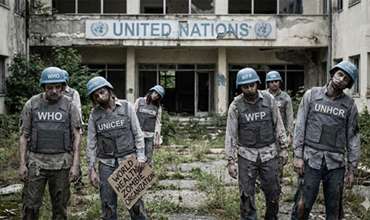


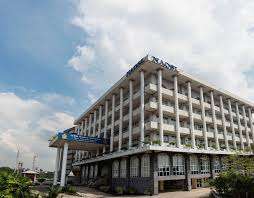
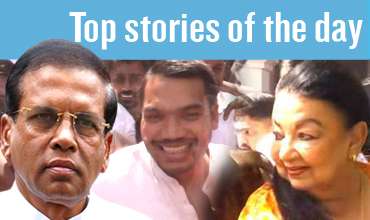

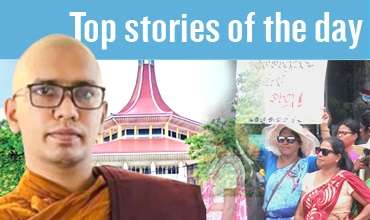

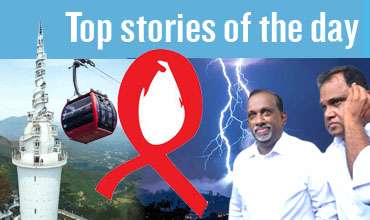


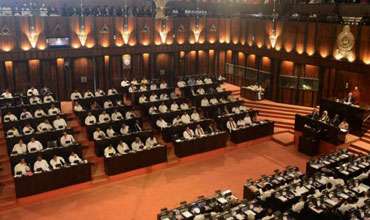
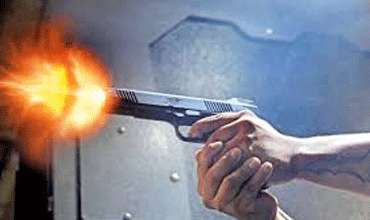
Leave Comments